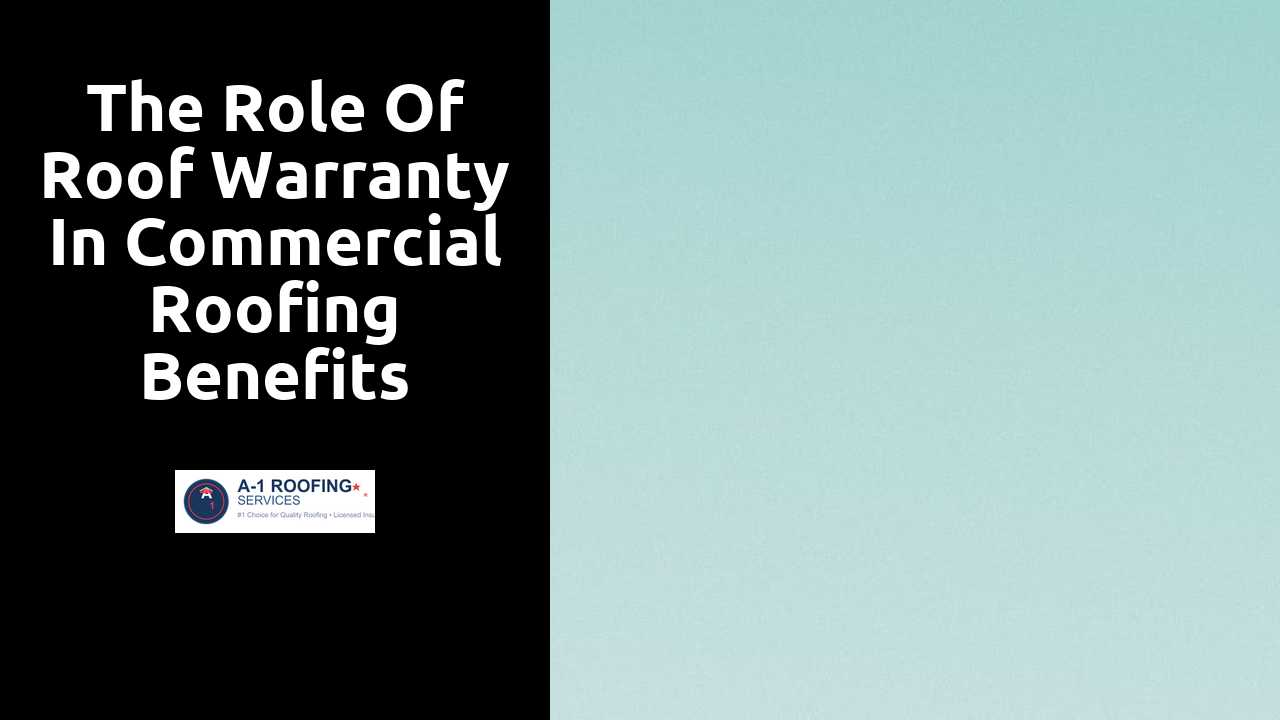
The Role of Roof Warranty in Commercial Roofing Benefits
Table Of Contents
Comparing Manufacturer and Workmanship Warranties
Manufacturer warranties typically cover defects in the roofing materials, ensuring that the products perform as promised. These warranties can extend for many years, depending on the manufacturer and the specific materials used. They often provide peace of mind for building owners, as they have recourse in cases of material failure. Homeowners can receive repairs or replacements under such warranties, but they must adhere to particular conditions outlined by the manufacturer.
Workmanship warranties, on the other hand, focus on the quality of the installation process. These warranties protect against errors made during the roofing installation, which can lead to leaks or other issues down the line. While they may not last as long as manufacturer warranties, workmanship warranties emphasize the importance of hiring certified and experienced contractors. Owners must ensure that their contractor provides such a warranty, as this reflects the commitment to a quality installation that supports the overall integrity of the roofing system.
See here for more great tips.
Which Warranty Offers More Value?
When evaluating warranties, it's essential to consider the specific coverage provided by both manufacturer and workmanship warranties. Manufacturer warranties typically cover materials and defects, ensuring that the roofing products will perform as promised. These warranties often last longer, sometimes ranging from 20 to 30 years, reflecting the manufacturer's confidence in their materials. On the other hand, workmanship warranties focus on the installation process, addressing issues that might arise from improper installation. While these warranties may have shorter durations, they are crucial for protecting against costs associated with labor mishaps.
Value can vary based on the unique circumstances of each roofing project. Some property owners might prioritize the longevity of material coverage, especially in regions with severe weather conditions. Others may place greater emphasis on the installation warranty, recognizing that even the highest-quality materials can fail if improperly installed. A thorough assessment of both types can help property owners make informed decisions that align with their specific needs and risk tolerance. Taking the time to evaluate how each warranty caters to distinct facets of roofing performance can ensure that property investments are well protected.
The Claims Process for Roof Warranties
Understanding the claims process for roof warranties is essential for property owners. The first step typically involves reviewing the warranty documentation to ensure that the issues fall under its coverage. Gathering necessary information, such as photographs of the damage and a detailed description of the problem, can strengthen the claim. Some manufacturers may require inspection by a certified contractor or roofing professional to validate the issue.
Once the required documentation is assembled, the next step is to contact the warranty provider. It’s important to follow their specific procedures for filing a claim, which may include completing a formal claim form. Timeliness is crucial, as many warranties stipulate that claims must be submitted within a certain period after the damage occurs. Engaging in open communication with the warranty provider can facilitate the process and ensure that any additional requirements are promptly addressed.
Steps to Take When Filing a Claim
Filing a claim for a roof warranty involves a clear understanding of the procedures outlined by the manufacturer. Begin by reviewing the warranty documents to grasp the specific coverage and terms applicable to your roofing system. Gather all relevant information, including purchase receipts, installation records, and photos of the damage. This documentation will serve as critical evidence to support your claim.
Next, contact the manufacturer’s customer service or warranty claims department. Be prepared to provide details such as your warranty number, a description of the issue, and the documentation you have compiled. Following their guidance is essential, as manufacturers often have specific forms and submission methods. Prompt communication can streamline the process and help ensure that your claim is assessed effectively.
The Relationship Between Roof Maintenance and Warranty Validity
Proper maintenance of a commercial roof is essential for ensuring warranty validity. Most manufacturers include specific maintenance requirements in their warranty documentation. Failure to adhere to these guidelines can lead to a voided warranty, leaving the property owner responsible for costly repairs.
Regular inspections and maintenance routines not only extend the life of the roof but also safeguard the investment made in the warranty. Keeping detailed records of maintenance activities can serve as crucial evidence if a warranty claim is ever needed. Adopting a proactive maintenance approach fosters a better relationship between property owners and manufacturers, ultimately enhancing the longevity and performance of the roofing system.
Keeping Your Warranty Active
Maintaining a roof warranty requires regular inspections and timely repairs. Roofs are exposed to various environmental factors that can lead to wear and tear over time. Neglecting routine maintenance can result in damage that may void the warranty. It is essential for property owners to follow the manufacturer's guidelines for upkeep. Documenting maintenance activities can also provide proof of compliance should any warranty claims arise.
In addition to regular upkeep, dealing with any roof issues as they arise is crucial for keeping the warranty in effect. Promptly addressing leaks, surface deterioration, or other concerns can prevent more significant problems down the line. Engaging qualified contractors for inspections and repairs ensures that any modifications meet warranty standards. Staying informed about the specifics of the warranty is vital, as different manufacturers may have varied requirements for maintaining validity.
Related Links
Benefits of Weather Resistance in Commercial RoofingTax Incentives for Upgrading Commercial Roofing Systems